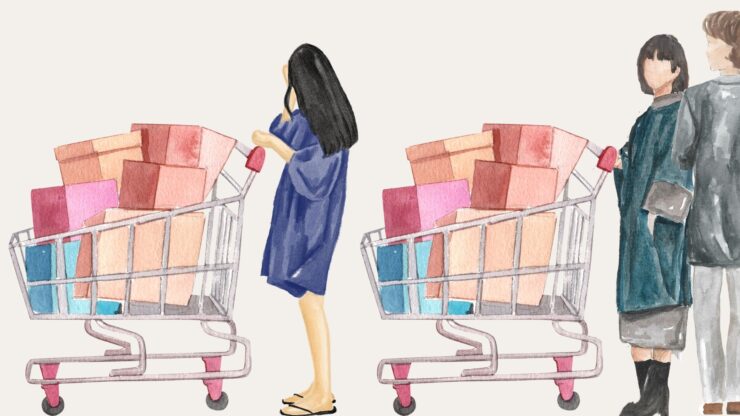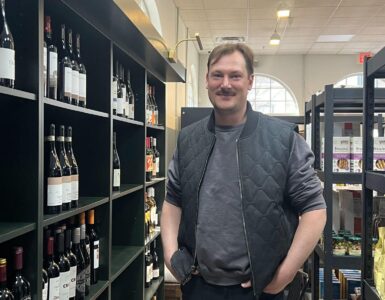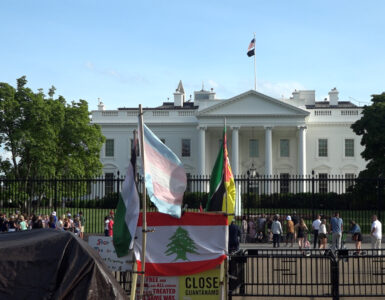Economists believe the tariffs hikes that President-elect Donald Trump is proposing have a strong likelihood of causing another wave of inflation in the early months of 2025, if they are enacted, and some consumers are stocking up on what they can before this potential jump in prices.
“I don’t think that things will be permanently unavailable, but it is true that there could be a lot of disruptions in the early part of 2025 if he really puts on tariffs of the magnitude that he’s talking about,” said Robert A. Blecker, a professor of economics at American University.
President-elect Donald Trump has proposed a 60% tariff on imported goods from China, prompting some consumers to stock up and upgrade to newer models of products as they anticipate inflation being passed on to them.
“If the tariffs are much higher, and they’re on many more countries, the firms, the intermediary firms, the wholesalers and the retailers and the importers and the distributors are not going to be able to absorb this and they will have to pass the cost on to consumers,” Blecker said.
Though the tariffs are just proposals, some consumers are not waiting to see if they are implemented.
Matt C., who did not wish to disclose his last name, said he anticipates Trump’s tariffs to hike the cost of many of his everyday-use items and has considered upgrading his car and the original water heater of his 25-year-old coastal Maine home.
“If we have increased tariffs on everything, and we have nobody to do the jobs that Americans won’t do, I see a real double whammy,” he said. “I expect that if we keep taxing imports, car prices are going to go up and they’re already pretty ridiculous.”
As a landscaper, Matt said tool components like trimmer string and chainsaw chains are typically made in China and are going to get more expensive to some extent and maybe to a much greater extent.
To get an idea of other items he may need to purchase before prices go up, Matt said he has been referring to Estimated Impacts of Proposed Tariffs, which the National Retail Federation produced, and said it has been helping him navigate through his larger purchasing decisions.
While Matt is doing what he can to stay updated on which industries could be slammed the hardest by tariffs, he expressed his frustration around Trump’s proposal.
“It’s basically just an enormous tax on the American consumer. It really irritates me,” he said.
Content creator Cynthia Buhler recently asked ChatGPT to give her a list of foods to stock up on before January, and shared the chatbot platform’s suggestions to her TikTok followers in the style of a food haul.
Even though she said she “didn’t really want to jump into AI” as a tool for guidance, she said it helped her understand which imported goods to consider stocking up on, such as wine and vodka.
Buhler’s TikTok video is captioned: “Grocery haul based on ChatGPT list to buy before tariff price increases” and features a table stacked with non-perishables, produce and frozen foods. The video received 13.8k views, though engagement numbers are the least of her concern.
@beautiful_home5 Grocery haul to fill the freezer Many items on sale at Amazon Fresh. Nows the time to stock up on holiday deals. #pantryorganization #stockingup #depressionera #foodscarcity #tariffs #groceryhaul #bulkfoodshopping #foodbargins #budgetfriendly #foodbargins #depressionera ♬ original sound – @Beautiful Home
“Even if I only get 200 views, if one person benefits from it somehow or they enjoy it, it’s useful to them and helps them, then I don’t need to be viral,” she said. “I figure if people are saving it, that means more to me than if they comment.”
In her home in Washington state, she has always sought after deals on groceries and said she would never pay full price, and she offers advice to consumers who may not have the means to stock up on items before prices increase.
“Between now and January, you know, if you can only afford one can of beans, buy two or three cans of beans when they’re on special and then you have that little bit of savings and security, a little bit more food security,” she said.
D.C. resident Fatima Toure said she thinks there are ways to mitigate the cost of food if tariffs are enacted, but admits she originally had not realized how taxed imports could affect her until it came up in conversation with her peers.
“That’s when I realized the severity of the issue…but now that I realize I am going to be affected, I am really worried about the price of things and how that’s going to affect me as a graduate student working part time, and also making minimum wage,” she said.
Toure said she wants to prioritize self-care products and buy beauty supplies in bulk, as the ones she often purchases are imported from Asian countries.
“Press on nails, hair bundles, certain clothing items and things like that…because of the tariffs they’re gonna start [to be] more expensive, especially through websites such as Aliexpress that are Chinese-based, which tend to offer a lot of discounts and price reductions,” Toure said.
Toure said she is worried about how tariffs are going to affect other aspects of her income, and has created a personal deadline for herself to buy the self-care items she needs.
“It’s definitely affecting how I go about purchasing items. I currently have a cart of things that I want to order prior to January,” she said. “Certain items I kind of have already, or I’m just working toward purchasing because I know that once the tariffs come, things are going to be a bit more expensive.”
While it is common for some consumers to stockpile items before prices inflate, American University economics professor Kara Reynolds is not sure if Trump will be successful in imposing such high taxes on imported goods.
“I think the big question is to what degree President Trump will be successful in what he has planned? There are many tools that he can use to impose tariffs on a specific country or on a specific product,” she said. “He’s been very successful in targeting China. It’s less clear how he would legally.”
Reynolds said that there are not many legal ways to do a broad increase on tariffs without going through Congress, adding that it’s not clear how Congress would “support that effort.”
Reynolds said she feels that Trump has the “right idea in mind” to develop more industries in the United States to increase manufacturing employment in the long-run but Blecker adds that it would “take a while to build up [to] that capacity.”
“It would be hard to find workers,” Blecker said. “We would have labor shortages that would probably push up wages and labor costs, and that would make inflation worse and not better.”
Both Reynolds and Blecker expressed their uncertainty in how the weight of tariffs would play out for both the economy and consumers, and Blecker advised consumers to try not to be too reactionary in their pursuit of bulk-buying.
“Trump loves to make these [tariff] deals. So it is all very unpredictable, but that does create a lot more uncertainty for consumers. And I think it’s a bad thing for the economy overall,” Blecker said. “I really hope people don’t panic and hoard goods, because that’s going to make it harder for everyone else like it did during COVID.”















Add comment